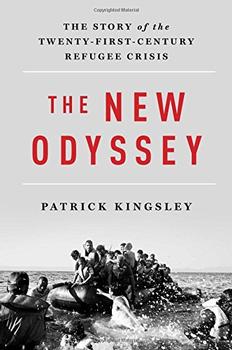Summary | Excerpt | Reviews | Beyond the Book | Read-Alikes | Genres & Themes | Author Bio

The Story of the Twenty-First Century Refugee Crisis
by Patrick KingsleyThis article relates to The New Odyssey
The New Odyssey brings to mind the original epic with which this book has many parallels. Literary works don't come much more venerable or influential than The Odyssey, a 12,000-line poem written in ancient Greek and composed sometime in the eighth century B.C.E. Granted, it's likely not every contemporary reader's favorite work (although you probably would have felt differently 2,000 years ago, when it was the poem to know). And for those countless generations of students who were forced to read The Odyssey, perhaps the work seemed more like an epic pain than an epic poem, but at least you had the "epic" part right. In fact, it's widely considered the most "epic" work in all of Western literature—perhaps ironic since it's not known with certainty who composed it or even whether it was ever intended to be written down.
Although the name "Homer" is often associated with the work, the truth is scholars are mostly agreed that "Homer" could be as much of a fiction as the poem itself (or, as the old joke among classics professors goes: "The Odyssey wasn't written by Homer. It was written by some other guy named Homer."). There is strong supposition that the poem began its life as an oration, the work of a poet working in the oral tradition. Gradually, the work might have been enlarged and expanded by subsequent generations of poet-storytellers.
The Odyssey is also literature's first sequel, picking up events after another work attributed to Homer, The Iliad, the story of the Trojan War. Knowledge of The Iliad is not necessary to enjoy or understand The Odyssey, which is the far more popular of the two works among general readers, but having some sense of the length (ten years) and significance (inspiring countless poems, operas, and films) of that war might help you empathize with Odysseus, the hero of the epic.
 Much of the popularity and continuing impact of the poem derives from the utter simplicity of its central conceit: put simply, a guy is just trying to get home to his wife and son. After the decade-long Trojan War ends, Odysseus—one of the heroes of the war—sails off to Ithaca to resume his life, but because of the interference of the gods, it takes him another ten years to return. In the meantime, his home in Ithaca is besieged by "suitors" trying to seduce Odysseus's wife Penelope, who remains faithful, clinging to the belief that her husband will return. Odysseus's son, Telemachus, now about 20 years old, has gone looking for his dad. After Odysseus finally makes it back to his homeland, father and son find each other and devise a stratagem to dispatch the suitors, of whom there are more than 100. Penelope might have caused them to lose their hearts but it's Odysseus who makes them lose their heads.
Much of the popularity and continuing impact of the poem derives from the utter simplicity of its central conceit: put simply, a guy is just trying to get home to his wife and son. After the decade-long Trojan War ends, Odysseus—one of the heroes of the war—sails off to Ithaca to resume his life, but because of the interference of the gods, it takes him another ten years to return. In the meantime, his home in Ithaca is besieged by "suitors" trying to seduce Odysseus's wife Penelope, who remains faithful, clinging to the belief that her husband will return. Odysseus's son, Telemachus, now about 20 years old, has gone looking for his dad. After Odysseus finally makes it back to his homeland, father and son find each other and devise a stratagem to dispatch the suitors, of whom there are more than 100. Penelope might have caused them to lose their hearts but it's Odysseus who makes them lose their heads.
Although it's been centuries since writers have regularly worked in the epic tradition, there's something undeniably alluring about the diction, rhythm, and style of the epic form, and though the language often strikes modern ears as convoluted, some readers find it as intoxicating as ouzo on ice. Here's a taste from the opening lines of the poem:
Tell me, Muse, of the man of many ways, who was driven
far journeys, after he had sacked Troy's sacred citadel.
Many were they whose cities he saw, whose minds he learned of,
many the pains he suffered in his spirit on the wide sea,
struggling for his own life and the homecoming of his companions.
[Translation by Richmond Lattimore]
Picture of Odysseus Overcome by Demodocus' Song by Francesco Hayez
Filed under Books and Authors
![]() This article relates to The New Odyssey.
It first ran in the March 8, 2017
issue of BookBrowse Recommends.
This article relates to The New Odyssey.
It first ran in the March 8, 2017
issue of BookBrowse Recommends.
Your guide toexceptional books
BookBrowse seeks out and recommends the best in contemporary fiction and nonfiction—books that not only engage and entertain but also deepen our understanding of ourselves and the world around us.